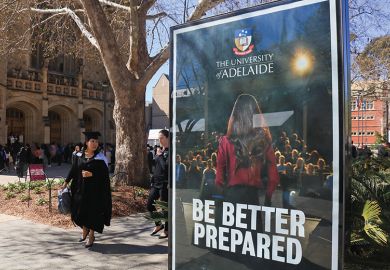A new analysis has reinforced concerns about the English language skills of international students in Australian universities.
Tertiary education analyst Andrew Norton crunched data from Australia’s 2016 national census to evaluate persistent claims about students’ poor English skills. He tallied people’s appraisals of their own English, restricting his analysis to answers from non-citizens who had arrived in Australia between 2014 and 2016 and were studying full-time at university.
Nine per cent of these respondents indicated that they did not speak English well. When the analysis was restricted to people from mainland China, that figure rose to 16 per cent.
Mr Norton, who recently stepped down as higher education programme director with the Grattan Institute thinktank, blogged that this figure was concerning but “at the lower end of what we might expect given the negative publicity around this issue”.
To investigate further, he analysed a recent University of Melbourne international student survey. “A quarter of them described their English fluency as ‘moderate’ and 4 per cent as low or very low,” he said.
“Is moderate English really enough for successful academic study? Intuitively I am sceptical. We at least need a better evidence base.
“Despite reassurances from the regulator and universities, there is little publicly available evidence to support a conclusion that the language issues are not serious enough to be a major concern.”
Mr Norton said that universities should report language test information on their international students. “With English on admission data linked to enrolment data, we could find out much more about the relationship between language ability and subsequent performance such as course completion [and] subjects passed or failed,” he said.
“A national dataset would let us identify, and possibly explore, university-level results that differ substantially from the national norm. Without more evidence and better regulation, the English language proficiency of international students is an issue that will not go away.”
Meanwhile, recently released data confirm that India is on the verge of overtaking China as Australia’s top source of international students – and is already ahead in providing fresh applicants from overseas.
The new figures show that ‘churn’ is the only factor maintaining China’s position as Australia’s top education market, with enrolment growth coming from students who were already in Australia and applying for follow-up visas.
The figures, from the home affairs department’s 2018-19 student visa programme report, suggest Chinese enrolments are on the verge of a significant downturn. When enrolment booms peak, growth often continues temporarily – fuelled by people changing their visa status – even though the number of new arrivals is declining.
The report is the latest indication that Chinese appetite for Australian education, which has bankrolled new buildings and research facilities in some of the country’s biggest universities, has waned amid a souring of the bilateral relationship.
The report also shows a sharp increase in enrolments from the Philippines, both in higher and vocational education. The archipelago has become Australia’s seventh top source country for international students, rising from 15th in just a year.
The International Education Association of Australia said there had been a sharp increase in nursing enrolments by Filipinos, triggered by an upgrading of language requirements for commencing students. This had led to active recruitment of aspiring nurses in the Philippines, where English levels tend to be higher than in neighbouring countries such as Vietnam.
Register to continue
Why register?
- Registration is free and only takes a moment
- Once registered, you can read 3 articles a month
- Sign up for our newsletter
Subscribe
Or subscribe for unlimited access to:
- Unlimited access to news, views, insights & reviews
- Digital editions
- Digital access to THE’s university and college rankings analysis
Already registered or a current subscriber?








